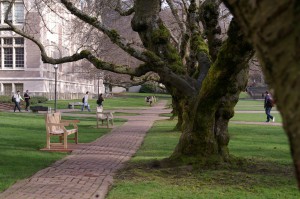By Holly Thorpe
Winter 2015 Kaplan Award Winner

January is usually an unapologetic time in Seattle. The soft grey of the skyline turns into the hard steel of cold — actual scarf-and-coat-and-gloves cold. And, like the sun-fueled creatures we are, we retreat into coffee shops and thick-yet-fashionable coats and wait for the deliverance of spring.
It is natural, then, that when we wake up and peer out of liquor-bottle-lined windows and dormitory curtains and see sun, we are illuminated. We approach campus, and the walk itself has filled us with something that was absent: light, warmth. The gentle rush of endorphins that is the feeling of sun on ungloved hands.
I volunteer outside of the Husky Union Building on a day like this. I ask students to sign a photo petition. I exchange small-talk.
“How’s it going? How’s your day been?”
“Not bad.” And “Yeah, pretty good.”
But some:
“Oh my god, this weather.”
Glowing, we celebrate with looks of can-you-believe-this? and wide smiles.
My shift is over. I leave the table and approach the Quad.
During orientation the freshmen are told that the trees are planted in the shape of a “W.” This is untrue. They are also told that you’re not allowed to climb on the trees, because they are old and sickly. This is also untrue. They are old, but they’re strong and they’ve aged elegantly. The arborist on campus once told me that they’re anywhere from 70-80 years old, but they can live to be 100. She also told me that she thinks the trees are there for the people, and isn’t it fun to see people perched in every one of the trees on the weekends? But she also said that’s not what she was supposed to say.
That’s what the people do, too. They perch. You can find them underneath the trees, and in the branches if they’re brave, and on the off-gray benches that line the quadrangle. They pull their knees to their chin, or they sit cross-legged, and they hold in front of them phones and cameras and books and writing pads. The 30 cherry trees that look like gnarled hands in January now line a microcosm.
I wonder, sometimes, if that microcosm isn’t inhabited entirely by people like myself: people who, once displaced into the city, take solace in all things green and natural. People who once woke up to rolling sage hills and the sweet smell of wildfire smoke. Some part of me still resides there and probably always will, the same part of me that could never exchange the snow on distant mountains— it looks like a dusting of confectioner’s sugar from far away — for graffiti and the acrid smell of cigarettes and car oil.
I navigate the brick walkway, uneven with roots and clumps of mud and gaps left by stolen bricks. I see a man with a button up shirt and jeans and nice shoes in between two of the trees. He appears to be about 50 years their minor. He is doing something quite peculiar. He’s standing on the very edge of the brick path, as though he might fall a very long way if he steps off, and his eyes are closed and he is facing the sun.
People use the word “bask” a lot, although I think it’s often unwarranted. The actress did not “bask in the audience’s attention,” she enjoyed it, at most. Lizards don’t “bask” in warmth, they need it, but they don’t revel in it.
This man, however, was basking. His hands dangling at his sides, his bag leaning against his right knee as he stands fantastically still. And every couple of moments, he turns his head to allow the sun to pool around his collar bone and touch both of his cheeks.
I grin at him, although he cannot see me, and I continue toward him. He continues to revel. He was, I thought at the time, the very image of a sunflower. Although it is wildly uncharacteristic of me I am so overjoyed at his pleasure that, as I pass by, I say to him:
“Gorgeous weather today.”
It must have come out sounding like a smile.
Although I don’t look back to see if he has turned from his sunning to see who had so rudely interrupted it, I think I see him pause to glance my way from the corner of my eye.
When I reach the edge of the Quad, I look back just before I lose sight of him. He is still there and his eyes remain closed.
